While in 1946, Robert Le Gall is born at Saint-Hilaire-du-Harcouët, three years later, Jigme Rinpoche comes into the world in Kham, in Eastern Tibet.
Soon thereafter, Jigme Rinpoche moves to Tsurphu, to Karmapa’s monastery in Tibet, and then, in 1959, to Rumtek Monastery in Sikkim, in North India, accompanied by the Karmapa and numerous reincarnate masters of all ages. There, he directly receives the entirety of the transmission of his tradition from Karmapa.
During this time, Robert Le Gall carries out his studies of philosophy and theology in Sainte-Ange de Kergonan and Solesmes Abbeys. He receives his diploma in theology from the Universty of Fribourg and completes his training with biblical studies in Israel.
1974 is an important year for both men: Robert Le Gall becomes an ordained priest. Later, as a Benedictine monk, he is elected abbot of Saint-Anne de Kergonan Abbey. Jigme Rinpoche becomes the designated representative of the Karmapa in Europe, and settles at the Karmapa’s official seat in Europe, Dhagpo Kagyu Ling in Dordogne.
Throughout the years, the two men carry out their respective activities. Today, one is archbishop of Toulouse and the other is the general secretary of the Karmapa, caretaking his activity throughout the world.
It is in 2001 that our two gentlemen meet each other, under the auspices of the publication of a book, Le Moine et le Lama (The Monk and the Lama) a dialogue between the two. They spend time together in their respective wards (Kergonan Abbey and Dhagpo Kagyu Ling) to exchange about themes essential to both traditions: Who are Buddha and Jesus? What is it to be human and what is the meaning of life? Is happiness the ultimate goal of life? Is there something after death? How do we pray; how do we meditate?
These simple and lively interviews, authentic and profound, gave rise to great mutual respect between the Buddhist monk and the Catholic monk. Dipping into their erudition, they exchanged on the basis of their personal experience and the responsabilities that each took on within their respective traditions.
They had the opportunity to further exchange throughout the course of the conferences that took place following the publication of the book. Next August 16, they will meet once more, on the occasion of the Dhagpo’s 40th anniversary. August 15th is, in the Christian tradition, the Day of Assumption. The Assumption commemorates Mary’s being taken in to Heaven, body and soul, without facing physical death, at the end of her life on earth. In this sense, her fate prefigures our own destiny. Taking this founding event in the Catholic tradition as a basis, Archbishop Le Gall and Jigme Rinpoche have chosen to exchange about the theme of liberation. What conditions must we assemble in order for the path, be it Christian or Buddhist, lead us as practitioners to liberation? And, in addition, what is the meaning of this word in each tradition?
The reunions of the two monks are joyful. They know each other well and can thus get directly into the essentials and continue together their exploration of the commonalities and differences amongst the two religions. Furthermore, both are known for the clarity of their explanations and, not to be taken for granted, their sense of humor.
Interreligious Dialogue: When Convictions Meet
Interreligious dialogue is a question of convictions. Conviction goes against preconception. It allows us to move from ignorance to knowledge. Our convictions develop based on our life history; they root profoundly within us. They are connected to our values and guide our life choices (even if life often shows us how hard it is to live our convictions on a day-to-day basis).
The stakes are high when we meet people with difference convictions. Dialogue as an exercize thus becomes invaluable. Encountering the other is a privileged opportunity to clarify our convictions. We cannot reduce the other to our own reality; in order to truly engage, we must open ourselves to the other’s questioning. If the dialogue is authentic, true listening can take place. In this way, the convictions of each are nourished.
Nevertheless, such a dialogue is a challenge each time. If we are motivated by an honest wish to engage and to discover with gratitude, we are then ready to put our convictions on the line and explore the fertile ground of enrichment, and also that of vulnerability. The risk of rigidity rests in ambush; we fall back on the degradation of convictions that are foreign to us, or we minimize the differences. In short, missing the opportunity of such an encounter is always possible.
Authentic dialogue does not try to modify what the other thinks, nor what we ourself think. It consists of real talk, remaining oneself and keeping an open mind and ear. The benefit of such an encounter is the enrichment of our vision of the other. As Jigme Rinpoche says in The Monk and the Lama, “Everyone of course continues to follow his own path, but successful dialogue becomes a powerful factor for peace and harmony which has an impact far beyond the circle of practitioners directly involved.”
Thus the importance of bringing together Monsignor Le Gall and Jigme Rinpoche again on the occasion of Dhagpo’s 40th anniversary: in order to allow the convictions of each to come to light and to life on his chosen path.
Puntso
[/fusion_text]
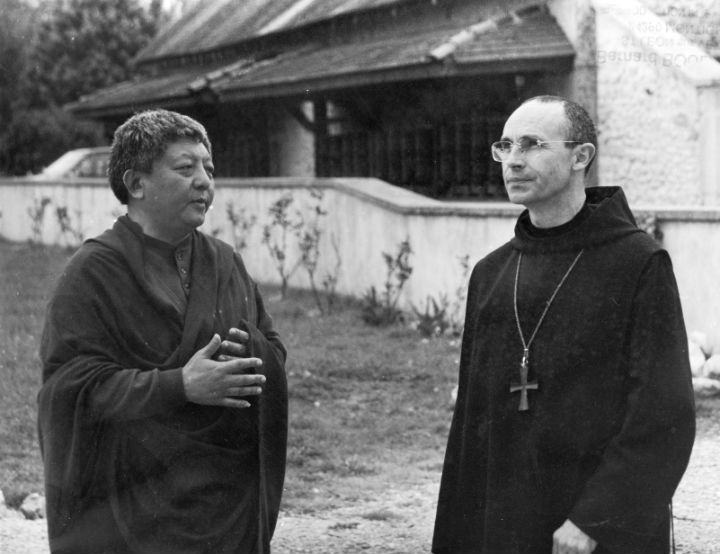
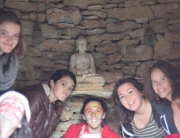
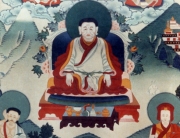
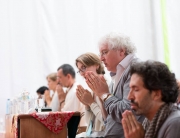
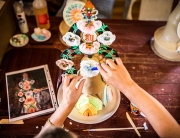
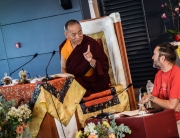



Leave A Comment